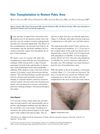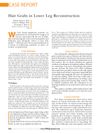 3 citations,
December 2007 in “Dermatologic Surgery”
3 citations,
December 2007 in “Dermatologic Surgery” Hair transplantation successfully restored a woman's pubic hair with natural-looking results and few complications.
 2 citations,
December 2022 in “Journal of toxicologic pathology”
2 citations,
December 2022 in “Journal of toxicologic pathology” Skin structure complexity and variability are crucial for assessing skin toxicity in safety tests.
 2 citations,
January 2021 in “JAAD Case Reports”
2 citations,
January 2021 in “JAAD Case Reports” Using a special laser and skin medication together successfully cleared a skin condition in a pregnant woman.
 2 citations,
September 2019 in “Dermatologic Surgery”
2 citations,
September 2019 in “Dermatologic Surgery” The two-step procedure of fat grafting followed by hair grafting improves scalp and facial scar correction.
 2 citations,
October 2015 in “The New England Journal of Medicine”
2 citations,
October 2015 in “The New England Journal of Medicine” The woman's surgery lowered her testosterone and improved scalp hair loss but did not change her excessive body hair.
 2 citations,
October 2010 in “Journal of dermatological treatment”
2 citations,
October 2010 in “Journal of dermatological treatment” External treatments can change hair growth patterns in nude mice.
 2 citations,
January 1997 in “Leprosy Review”
2 citations,
January 1997 in “Leprosy Review” A neglected leprosy treatment led to rare scalp hair loss in an Indian woman, which improved with proper medication.
 1 citations,
October 2023 in “Life science alliance”
1 citations,
October 2023 in “Life science alliance” Pantethine may boost the immune system's ability to fight sarcoma.
 1 citations,
April 2023 in “Clinical, cosmetic and investigational dermatology”
1 citations,
April 2023 in “Clinical, cosmetic and investigational dermatology” Antigens from skin cells may cause hair loss in perinevoid alopecia.

Using microneedling with PRP improves skin and hair conditions more than microneedling alone.
 1 citations,
October 2020 in “Journal of Cosmetic Dermatology”
1 citations,
October 2020 in “Journal of Cosmetic Dermatology” Possible link between hair loss and metabolic syndrome, with RANTES as a potential clue.
 1 citations,
July 2019 in “Medicina Clínica (English Edition)”
1 citations,
July 2019 in “Medicina Clínica (English Edition)” Tofacitinib partially improved hair regrowth in a patient with severe hair loss.
 1 citations,
August 2018 in “Journal of Investigative Dermatology”
1 citations,
August 2018 in “Journal of Investigative Dermatology” Muse cells keep their special features and can become different cell types even after being frozen and thawed three times.
 1 citations,
January 2018 in “Journal of Steroids & Hormonal Science”
1 citations,
January 2018 in “Journal of Steroids & Hormonal Science” Oral vitamin D treatment can help some children with alopecia areata who have vitamin D deficiency.
 1 citations,
May 2017 in “InTech eBooks”
1 citations,
May 2017 in “InTech eBooks” The document concludes that alopecia areata is an unpredictable autoimmune hair loss condition with no cure, but various treatments exist that require personalized approaches.
 1 citations,
April 2017 in “Journal of Investigative Dermatology”
1 citations,
April 2017 in “Journal of Investigative Dermatology” A new one-step test can quickly identify skin cancer during surgery.
 1 citations,
April 2017 in “Journal of Investigative Dermatology”
1 citations,
April 2017 in “Journal of Investigative Dermatology” Topical glucocorticoids thin the skin and change collagen structure.
 1 citations,
April 2017 in “Journal of Investigative Dermatology”
1 citations,
April 2017 in “Journal of Investigative Dermatology” Cilostazol may help hair grow and could be a new treatment for hair loss.
 1 citations,
August 2016 in “Journal of Investigative Dermatology”
1 citations,
August 2016 in “Journal of Investigative Dermatology” Activating STAT5 in the skin's dermal papilla is key for starting hair growth, regenerating hair follicles, and healing wounds.
 1 citations,
July 2015 in “Cytokine”
1 citations,
July 2015 in “Cytokine” Finasteride improves immune response and reduces organ damage after trauma hemorrhage in mice.
 1 citations,
January 2013 in “The Journal of Dermatology”
1 citations,
January 2013 in “The Journal of Dermatology” A skin condition called pyodermatitis vegetans was found in a patient with multiple myeloma for the first time.
 1 citations,
January 2013 in “Archives of Aesthetic Plastic Surgery”
1 citations,
January 2013 in “Archives of Aesthetic Plastic Surgery” Combining liposuction with laser ablation effectively reduces underarm odor with minimal side effects.
 1 citations,
October 2008 in “Expert Review of Dermatology”
1 citations,
October 2008 in “Expert Review of Dermatology” Frontal Fibrosing Alopecia is a slowly progressing hair loss condition, likely underdiagnosed, with ineffective treatments, needing more research to understand it fully.
 1 citations,
July 2007 in “Plastic and Reconstructive Surgery”
1 citations,
July 2007 in “Plastic and Reconstructive Surgery” Hair grafts improved the look of a man's leg after an accident and the patient was happy with the results.
 December 2024 in “International Ayurvedic Medical Journal”
December 2024 in “International Ayurvedic Medical Journal” Ayurvedic treatments may help reduce hypothyroidism symptoms.
 April 2024 in “Proceedings”
April 2024 in “Proceedings” People with alopecia areata often have lower iron levels than healthy people.
 March 2024 in “Romanian Medical Journal”
March 2024 in “Romanian Medical Journal” Early diagnosis and treatment of achalasia and hyperthyroidism improve patient outcomes.
 January 2024 in “bioRxiv (Cold Spring Harbor Laboratory)”
January 2024 in “bioRxiv (Cold Spring Harbor Laboratory)” A specific enzyme is essential for proper hair follicle stem cell development and healthy skin.
 January 2024 in “Frontiers in immunology”
January 2024 in “Frontiers in immunology” Histone modification is key in treating chronic inflammatory skin diseases.
 December 2023 in “Journal of health and rehabilitation research”
December 2023 in “Journal of health and rehabilitation research” Oral Apremilast effectively treats alopecia areata in most patients.






























